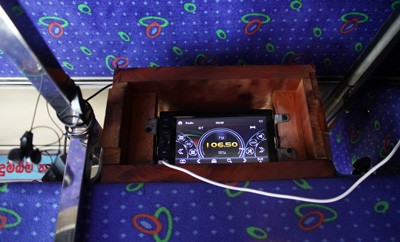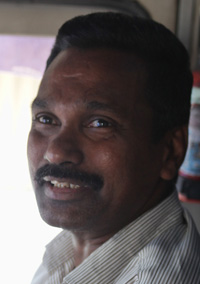News
Music on buses still not hitting the right note
Bus drivers are in danger of falling asleep to the olden day movie songs the National Transport Commission (NTC) wants them to play on long-distance trips, several of them said this week.

Some like the soothing tones of golden oldies, others prefer more upbeat music. Pix by Sameera Weerasekera
But commuters are divided. Some were relieved at not having to sit through the boisterous music some drivers tended to have on while others were nostalgic for more “nagala yana sindu”–upbeat tunes like baila.
Many bus drivers do still play their preferred songs despite the NTC releasing an approved playlist. “Music is meant to be enjoyed, isn’t it?” asked Ruwan Priyantha, who has driven a Colombo-Kandy bus for 18 years. “Not tolerated.”
On Friday afternoon, the Pettah central bus station was bustling with people. Between their turns, bus drivers and conductors offered their views. Sanjeewa, who has been plying the Kataragama highway for the past four years, said the recommended playlist just wasn’t practical. It served no benefit to drivers although “a few passengers” might like it.
“And some passengers argue with me and my conductor, demanding something more upbeat to be played,” he complained. The ‘one size fits all’ policy doesn’t work with music.
So, while Ruwan liked the new list, the trouble was that young people didn’t. He had contemporary music playing on his bus while he chatted and said they sometimes put on “normal songs”. “When the playlist is done, we have songs from artistes like H R Jothipala and Chandrasena Hettiarachchi that people can listen to,” he explained.
There was no evidence that any of these drivers had availed themselves of the NTC playlist. One was under the impression he had to pay for the songs (it is a free service). Another said there were 300 songs when there are a 1000. But they did know they had to take a thumb drive to the NTC for the songs to be copied onto.
Ruwan felt that the new rule was “ninety per cent good” as the music culture on board was getting out of hand. He had trouble traveling with his wife and child on other buses because of inappropriate content being shown on TVs.
But drowsiness was a common complaint. Drivers claimed loud music helped stave off monotony and lethargy on long routes. A Nuwara Eliya-Colombo conductor said repetitive music made 16-hour journeys unbearable, indicating, also, that the same crew was carrying out turnaround trips.
“This will soon become another business for the Government to earn some money,” he said, requesting anonymity.
Drivers echoed him. Music of their choice helped them fight drowsiness, they said. Some who went to destinations like Badulla and Trincomalee didn’t even have the playlist.
Passengers, naturally, had varying views. One man from Ampara, who was traveling with a baby, personally preferred louder music as it made the long commute easier. The songs weren’t as bad as people said they were, he said.
Thilakaratne, from Trincomalee, complained that some buses went overboard with the decibel levels. But things have improved. “Now they play a hybrid of modern pop songs and oldies,” he said, confirming what drivers said about switching between the prescribed list and music of their choice. Long commutes made repetitive music unbearable and he appreciated efforts to get bus crew to turn down the sound.
Nalaka Perera takes the Wennapuwa-Colombo bus and fully backed moves to encourage lower volumes and “better” music. But he is yet to see it implemented, he said. None of the buses he took had given up “the depressing noise”. Sometimes, it got so bad he felt like dismounting halfway just to escape it.

Thilakaratne, passenger from Trincomalee

Ruwan Priyantha, who has driven a Colombo-Kandy bus for 18 years

Nalaka Perera takes the Wennapuwa-Colombo bus
There was no real common ground to be found. The differences in opinion were wide and pointed to differences in culture, taste and backgrounds, among other things.
The response to the NTC-approved playlist has been good, said Dharma Wanninayake, Transport Ministry Spokesperson. The owners of buses cooperated in minimizing loud music to a more reasonable 60-80 decibels.
A survey NTC conducted before implementing the playlist showed that 68 percent of the 10,000 passengers in the sample said noise pollution caused by blaring music was extremely bothersome. The 1000 chosen songs included “patriotic”, Tamil and Hindi songs as well as hits from old movies which Mr Wanninayake insisted were “not repetitive”.
Most buses with this “bad habit”, he said, did short-distance trips from Moratuwa and Panadura. And he said loud music did not keep drivers awake, as they had claimed.
“The initial minutes of music can stimulate the brain but it wears off when habituation occurs,” confirmed Nivendra Uduman, Counseling Psychologist. “There must primarily be more regulation on driving hour limits and sleep hour requirements for drivers so they do not feel the need to depend on music to stay awake while maneuvering a vehicle full of passengers.”
As for follow-up, Mr Wanninayake said public involvement was crucial. They must report any violations to the NTC hotline 1950. Paying customers had every right to do so.
There must be an attitude change in the industry, said Sherin Athukorala, the NTC’s Director Quality Assurance and External Affairs. The new move was not enforced as law for several reasons.
Firstly, the issue was current. But the required administrative clearances and coordination would delay implementation. And an attitude shift brought about by awareness-raising would work better than cracking the whip.
But action can be taken on public complaints under violations to route permit conditions, Ms Athukorala said. These rules obligate conductors and drivers to ensure passengers are not harassed. And, if they refuse a public request to turn down the music, it amounts to harassment and could entail a retraining, warning or fine, based on the situation.

